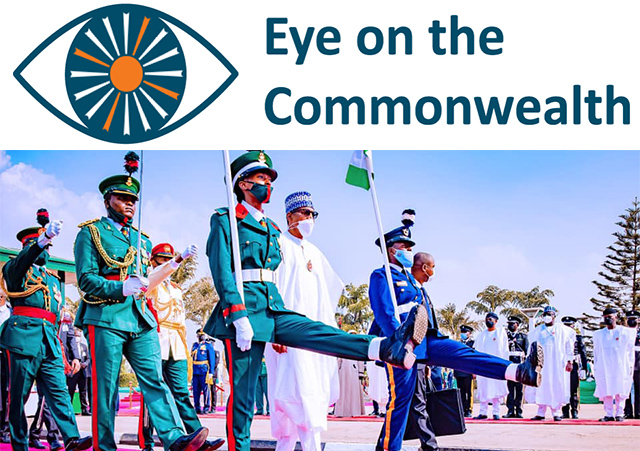 President Buhari said in a Facebook posting on 15 January: “Our faith in our Armed Forces remains unshaken”. [picture: President Buhari Facebook post]
President Buhari said in a Facebook posting on 15 January: “Our faith in our Armed Forces remains unshaken”. [picture: President Buhari Facebook post]
They arrived in the villages on motorbikes and fired at anyone they could see in a series of attacks over three days. Many of those who tried to escape were pursued and shot, survivors said. About 200 civilians are believed to have been killed in the massacres in 18 villages in the Anka and Bukkuyum districts of Zamfara state in January but, as one villager told AFP, the search for bodies continued as ‘many people are unaccounted for’.
The latest incidents of ‘banditry’ in Nigeria’s north-east, and the airstrikes on the gunmen’s bases by the military that preceded them, had left about 10,000 people homeless as they fled the fighting, the federal government said. In a statement, President Muhammadu Buhari claimed the attacks were ‘an act of desperation by mass murderers, now under relentless pressure from our military forces … These criminals will be history.’
Few observers believe this: such attacks also occur in three other states. And as well as taking the cattle of their unfortunate victims, the bandits have also turned to kidnappings. There are an estimated 30,000 people living off abductions for ransoms. More than 780 children were kidnapped last year – 317 of them from one school. One man in Katsina state hit the news recently when he stripped his roof to sell its metal sheets to pay off the bandits who had taken his son. When he went to pay them, he was himself taken hostage.
Banditry is far from the only armed conflict in Nigeria. In 2015, Buhari had also confidently dismissed Boko Haram’s six-year insurgency, pronouncing the Islamist militants ‘technically defeated’. More than a year ago, a Financial Times editorial scoffed at the claim, stating: ‘That has proved fanciful. Boko Haram has remained an ever-present threat.’
Last week, the Irish Times reported how the ‘forgotten conflict’ had continued, with a semblance of peace in the north-east only possible because the army had created garrison towns with trenches dug around even the Borno state capital, Maiduguri. The war against Boko Haram, and the Isis-affiliated Islamic State in West Africa, which is rapidly eclipsing its more established rival, has so far displaced at least 2.4 million people and caused perhaps hundreds of thousands of deaths, though no one has accurately counted them.
The Islamists trying to carve out a caliphate in north-east Nigeria are not the only would-be secessionists threatening Nigeria’s territorial integrity. In the south-east, there is still a strong Biafran separatist movement, which was boosted by the election of Buhari, a commander in the brutal Biafran civil war. The Indigenous People of Biafra, a prominent separatist movement banned in Nigeria, unnerved the government enough for it allegedly to abduct the leader, Nnamdi Kanu, from Kenya last year (Nigeria said only that he had been extradited after cooperation between its intelligence services and Interpol). Meanwhile, in the south-west there are Yoruba separatists, whom the government also accuse of planning an insurrection.
Last month’s fighting in Zamfara has its roots in the long-running conflict between nomadic herders and farmers across much of central and northern Nigeria as competition for land and water grows. Exacerbating this is the sectarianism underlying the country’s north-south divide, with the pastoralists being overwhelmingly Muslim Fulanis and their more settled rivals mostly Christians of varying ethnicities. This struggle over resources in turn partly stems from Nigeria’s burgeoning population – it has doubled in the past 30 years and is projected to double again, to 400 million, in the next 30.
As the population grows, so the economy flags. A country that exported food at independence is now a net importer. And after enjoying oil revenues of $419bn in the past decade, Nigeria still has more than 82 million, or 40% of its population, living on less than $1 a day – a greater number than India. This poverty breeds violence, insurgencies and jihadism but even Buhari, former military dictator, cannot guarantee security. The BBC recently wrote of a new wave of coups across west Africa in an article headlined ‘return of the military strongmen’. Nigeria’s military might well decide that a former general was not enough of a strongman and seize power again, just as it has nine times before since 1966.
The Financial Times’ Africa editor, David Pilling, recently asked: what is Nigeria’s government for? Noting that the country’s admirable dynamism in areas such as technology and the arts were in spite of the government rather than thanks to it, he said Nigeria desperately needed ‘an administration whose energies go not into preserving its own privilege but into providing public goods’, such as education, health, power, roads, infrastructure, the rule of law and security.
Of all of these, perhaps the last two are the most vital. Kingsley Moghalu, who has declared himself a candidate for the presidential elections next year, said after last month’s attacks that lives had become ‘valueless’ in Nigeria. ‘When will this end?,’ he tweeted. ‘When we elect a competent government that can secure our lives, the first duty of government.’ In this Hobbesian exchange, Nigeria’s rulers have singularly failed.
Commonwealth Update became Eye on the Commonwealth in January 2022. After 38 years in print form, the column has moved from the Round Table journal to the Round Table’s website. Originally Commonwealth Notebook, the column became Commonwealth Update in 1993. The new-look Eye on the Commonwealth will seek to provide a perspective on a topical development by the journal’s Commonwealth Update editor, Oren Gruenbaum.



